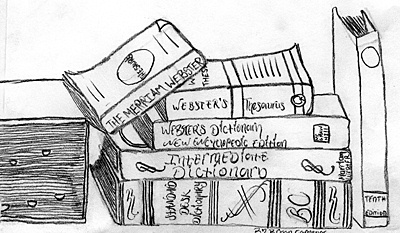All Nonfiction
- Bullying
- Books
- Academic
- Author Interviews
- Celebrity interviews
- College Articles
- College Essays
- Educator of the Year
- Heroes
- Interviews
- Memoir
- Personal Experience
- Sports
- Travel & Culture
All Opinions
- Bullying
- Current Events / Politics
- Discrimination
- Drugs / Alcohol / Smoking
- Entertainment / Celebrities
- Environment
- Love / Relationships
- Movies / Music / TV
- Pop Culture / Trends
- School / College
- Social Issues / Civics
- Spirituality / Religion
- Sports / Hobbies
All Hot Topics
- Bullying
- Community Service
- Environment
- Health
- Letters to the Editor
- Pride & Prejudice
- What Matters
- Back
Summer Guide
- Program Links
- Program Reviews
- Back
College Guide
- College Links
- College Reviews
- College Essays
- College Articles
- Back
Fiction Is Fact
If you want to learn the secret to winning an argument, turn to your bookshelf. Stories are the most engaging and effective way to introduce a new perspective. We often forget that everyone we meet has their own perspective and identity, shaped little by little over time by their countless experiences. Stories turn villains into heroes, spin misunderstanding into empathy, and bridge the gap between individuals by stressing the universality of the human experience.
When I was younger, my parents scolded me for reading too much fiction. They threatened to ground me from reading, telling me I spent too much time lost in fictional worlds as opposed to paying attention to the real one. I shrugged and read on anyways. I didn’t think about a tangible benefit to reading- I read because it was fun. I was not aware of fiction’s most important virtue until eleventh grade english.
Every weekend, we wrote about the rhetorical strategies of a different essay. One week, we read Neil Gaiman's speech about the importance of reading. Reading offers an escape, he said, and increases intelligence; but most importantly, reading teaches empathy. That last point really struck me. I realized then my reading taught me more about empathy than I could have learned anywhere else.
Reading is the only way to meet characters from all walks of life and actually get inside their heads. Fictional reading is a portal to different thoughts, fears, desires- everything that makes us human. In “How to Tell A True War Story,” Tim O’Brien explores the idea of a story being subjectively true while being objectively questionable. It does not matter if the factual events actually happened because he’s telling you how his experiences made him feel. This makes the story, at its very core, representative of the most fundamental truths of the human experience.
People are becoming increasingly aware of the impact storytelling has on decision making, whether it be small-scale choices or larger than life decisions. An integrative biology student at the University of California, Berkeley collaborated with Pixar storytellers to explain research findings in a way that would make the public care about their issues. Those who integrate communication with other disciplines recognize that spinning information into story does not merely facilitate understanding: it elicits an emotional response. A moving story about one person's trauma is more powerful than a statistic about thousands of people. We are wired to respond to stories because they remind us that anything that happens to one person could happen anyone, including ourselves.
To convince someone to agree with you, stop thinking in terms of raw facts and logic and appeal to his or her human side. Sprinkle bits of logos into the pathos, as Antony did when addressing his friends, Romans, and countrymen. Primarily emphasize emotional appeal. When you read statistics, consider new policy, notice changes around you, and stop and think about how other individuals will be affected. Put yourself in the pages of someone else’s story. Remember that the human experience is universal because we all feel the same emotions, just at different frequencies.
Fiction has taught me more about truth than anything else I have read. The guilty beating of a tell-tale heart? That’s real. Holden Caulfield’s desire to preserve innocence? Real. The burgeoning greed of Orwell’s pigs, Nick Caraway’s judgmental attitude and self-image of perfection, the ostracism felt by Hester Prynne and her daughter Pearl, all of these things are real, because all of these things have been seen and felt. Stories help us understand one another. Now, more than ever, when our world is becoming smaller and smaller, it is important to understand others and their perspectives, to acknowledge identity as a product of environment and circumstance, and to realize that “normal” is not the same for everyone. We must step outside ourselves to see things as they really are.

Similar Articles
JOIN THE DISCUSSION
This article has 0 comments.

This essay was inspired by an assignment I had to do in eleventh grade english. It really made me think about the importance of literature and reading, and how everyone should read more.